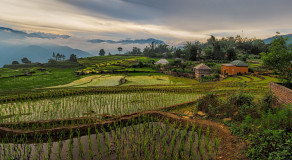
What does it mean to be a Responsible Tourist?
What does it mean to be a responsible tourist? How does one travel responsibly? Does responsible tourism only relate to taking care of the planet or does it also relate to how we interact with the people and the cultures we come across when away from home?
It’s probably fair to say that everyone has their own idea of what responsible tourism is and that some travelers are more consciously aware of their responsibilities when visiting a foreign country than other. The team at Connecting Worlds loves to travel and we have lots of experience in coming into contact with new customs and behaviours for the very first time. For us, the idea of responsible tourism can be applied on a large or small scale. Regardless of the size, everyone should take the idea of responsible tourism seriously. We all have a job to do when in a foreign place — to respect that foreign environment and the lives of those people who live there.
Here are a few ideas about what we believe it means to be a responsible tourist…
1. Connect with local culture: One of the easiest ways to be a responsible tourist is to fall in sync with the codes and conducts of local culture by watching local people and following suit. It’s important to show respect for the ways in which things are done, before casting your opinions and the age-old phrase, “but back home we do this differently.” Eat when locals eat, and make sure you try local food. Give everything a go before deciding that it’s not for you.
Respect mealtime customs — use your hands if appropriate, or follow the rest with cutlery when this seems to be the general rule. Be observant of local behaviour and try to blend in as best as you can. Invest in local artisanal work and support local people in their various trades, instead of spending your money in large stores which have perhaps contributed to economic struggles at the working-class end of the spectrum.
2. Go where the locals go:Another form of responsible tourism is to try to experience what life is like for local people as much as possible during your stay. It’s easy to visit any place in the world and live the life of a tourist — the life of a passer-by, a stranger. Responsible tourists make the effort to do things local people do and see the place they’re visiting through the eyes of local people.
Find out where the local markets are that people do their food shopping at, instead of relying on hotel meals or dining at restaurants for breakfast, lunch and dinner. Find out what bars local people frequent, instead of sticking to the prepared tourist track of places to go out in at night. These bars will open your eyes to what life is like on a daily basis for people who live in the place you’re visiting. You’ll get a sense for the general feeling of local people and local life. You’ll also get a better idea of how much things cost for locals and what they’re monthly budgets are like.
3. Use local transport: It’s easy to rely on taxis when in a foreign place, or to even rely on transfers that hotels or tour companies can arrange for you. The responsible tourist chooses local transport and independent forms of travel over the tourist prepared kind, as a way of better understanding the community they are visiting and in which they’ve chosen to stay, albeit for a short amount of time.
Get on the bus or tube at rush hour and experience first hand what it’s like for the people of that place to travel around on a daily basis. Also, if the local transport is financed by the state, your monetary contributions are doing something to help the economic stability of that place.
4. Make an effort with the local language:The responsible tourist never arrives to any place without at least having learned a few of the basic words or phrases if visiting a place where the native language is foreign to them. Everyone can learn to say please, thank you, hello, and goodbye, in a foreign language and at least make an attempt to communicate with locals in their native tongue. This is particularly important when visiting remote, rural locations where it’s more than likely that English is not spoken or understood by the majority of the population.
5. Read up and be informed: Tourists who inform themselves about the places which they are traveling to before arriving are also actively participating in responsible tourism. Arriving to any country without any idea of the language they speak, the currency they use and what the economic stability of that economy is, for example, isn’t a very responsible way of traveling. You should read up about the political state of affairs in that country before you visit.
You should do your best to research into important historical events, what other kinds of indigenous languages might be spoken besides the national language, what kinds of products that country exports and where, and what kind of rights and/or state provisions that country’s government provides to its people.
By investigating into these different areas, you’ll begin to develop an idea about the kind of country you are about to walk into and you’ll be able to better understand and respect the lives of those around you when you arrive. It’s a responsibility that all tourists should take on board.
Get Involved - Create Change
If you're looking to share your skills for positive change-then join us to make a difference!

























